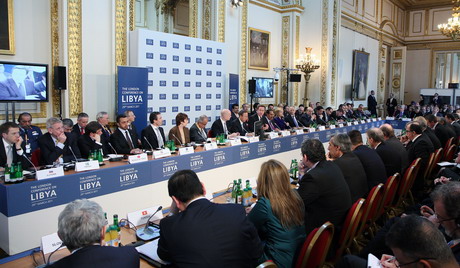
From the Editors of the New York Times: The United States, its allies and Libyan rebels all want to see Col. Muammar el-Qaddafi out of power and support United Nations-mandated military action to keep him from slaughtering innocent civilians. But as an international conference of those allies proved on Tuesday, they are going to have to work hard to maintain that unity of purpose, and they have a long way to go to flesh out a long-term strategy for Libya. …
It set up a contact group to coordinate political efforts on Libya’s future and backed an offer by Qatar to sell oil produced by the rebel-held parts of Libya to pay for humanitarian needs. The meeting also resolved to keep up the pressure for Colonel Qaddafi to quit. But it announced no significant new steps to aid the rebels and no broader vision for helping them establish an alternate government either now or once Colonel Qaddafi is gone. …
Although allied airstrikes helped rebels regain battlefield momentum, pro-Qaddafi forces on Tuesday halted a westward push by the rebels and began a counteroffensive. The allies should arm the rebels if needed, and both the United States and France said that is possible. We understand their desire to learn more about the rebels — a disparate, disorganized and largely unknown group — before making that decision. …
The United States and its allies have taken on a huge burden and lofty goals. They have a lot more to explain about what they mean and how it all will be carried out. (photo: EPA)
Image: epa%203%2030%2011%20London%20Conference%20on%20Libya.jpg
